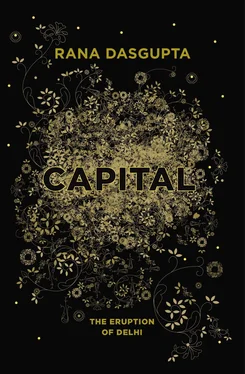“I have dedicated my life to this work. I am a single person, so I can give everything to what I do. I work eighty-hour weeks and I still bring work home because there is no end. When I have money I give it to this work. I live with my parents and I have no needs. I left my earlier life in a textile export business because I didn’t like it. I don’t want to be in a capitalist world, simply earning money and looking at my life like a bank balance. I love to work for people. I like work that can help someone or actually shape someone’s life.
“If I stood today for the council elections at Bhalswa, I would certainly win. Even my brother says that I should do this so that I can earn a lot of money and change my lifestyle. But I don’t want to do this. My brother says that trying to understand me is like beating your head on a stone.
“I don’t know what will happen to me in the future. But I know that my life will never be ‘normal’. I know it will continue to be as it is now. A prolonged fight. So I try to prepare myself for the future by living without things. Now I have many things because I live with my parents, but I try to live without milk, without fruit, because I know that in the future I may not be able to have those things. I try to see whether I will be able to survive if I have to live alone, or without food.
“My father is very unhappy that I spend all my time in a slum. He is suspicious of migrants and the poor. At the place where he worked, if he saw four people talking, he would start to wonder what they were talking about. Are they talking against the country? He thinks like the intelligence services. If he hears people speaking Bengali, he will assume they are illegal immigrants from Bangladesh because he is trained like that.
“His thinking is middle class, so I don’t discuss things with him. There’s no use fighting with him about issues he cannot understand. He says I have turned into a slum girl. I feel bad about this but I can’t help it. I know what I am doing. I know I have no money, but I still feel I am better than that other world.
“When I was a child, my mother used to tell me, ‘When you die, no one will even ask about you.’ I used to reply to her, ‘Mother, when I die there will be a thousand people weeping behind my body.’”
[The bourgeoisie] has pitilessly torn asunder the motley feudal ties that bound man to his ‘natural superiors’, and has left remaining no other nexus between man and man than naked self-interest, than callous ‘cash payment’… It has resolved personal worth into exchange value, and in place of the numberless indefeasible chartered freedoms, has set up that single, unconscionable freedom — Free Trade.
— Karl Marx and Friedrich Engels, The Communist Manifesto , 1848
It will come as no surprise that the warrior ethos did not allow much room for concern about the weak. Life was war. Too bad for the ones who could not fight.
The members of the flourishing bourgeoisie that is the subject of this book constituted, of course, a small minority of the Delhi population. They owed much of their prosperity, indeed, to the fact that they were situated in the middle of an ocean of poverty. Sweeping away from Delhi’s south-eastern edge was the vast swathe of Uttar Pradesh and Bihar, where 300 million people earned an average of $500 per year. Not only were they very poor, they were also politically weak and their lives were getting worse. They constituted therefore a cheap and near-infinite resource for the labour-intensive industries — such as construction, mining and manufacturing — that made Delhi wealthy.
The fact that their lives were getting worse was not despite the boom in the Indian economy but because of it. The boom was fuelled, in part, by a corporate occupation of the countryside which pitted big money against poor agricultural and tribal communities, turning rural India into a turbulent and volatile battleground. Expanding business needed land, and most of India’s land was in the hands of small farmers, whose legal ownership of it had been well secured during the Nehru years. Since most farmers owned only a hectare or two each, and since most of them did not wish to sell, acquiring hundreds or thousands of hectares of contiguous land was almost impossible to pull off legally and within businesslike timeframes. So the post-liberalisation period was witness to various forms of seizure involving millions of hectares of rural land.
Sometimes this was achieved by so-called land mafias. Many large fortunes were acquired in those years by ‘land-aggregators’ who got farmers off their land with gang violence, or who used connections in the political establishment not only to arbitrarily re-allocate land but also to enforce the order with state resources — such as the police. But often the land grab was enacted by the state according to the terms of the Land Acquisition Act of 1894, an instrument introduced by the British empire to legalise the expropriation of lands from their historical owners to the colonial power — and indeed the rampage of Indian elites in their own country bore a significant resemblance to that of nineteenth-century European imperialists in other countries. Land was repossessed under an authoritarian law, little or no compensation was given to the people who previously made their living from it, and it was sold on, often at ten times the price, to corporations, which then used it in ways that actively destroyed the living of that place — employing the former landowners, now conveniently destitute, as construction workers, miners and factory labour.
Farmers who protested against the forcible acquisition of their land for the purposes of Special Economic Zones or automobile factories sometimes found themselves jailed or, in extreme cases, shot. But such a large-scale and devastating revolution could not proceed without widespread resistance. At any one point there were hundreds of protests across the country over land appropriation. Most distressingly for the political establishment, an armed Maoist rebellion swept the country’s most devastated rural regions, and in many places usurped all state control. By 2006, armed groups were organised throughout the eastern states of Bihar, Jharkhand, West Bengal and Andhra Pradesh, and were said to occupy a fifth of India’s forests. Prime minister Manmohan Singh declared in that year that they represented the ‘single biggest security challenge ever faced by our country’ 33— which was something of a shock to urban elites, most of whom found it difficult to imagine, by that time, that they shared their country with hundreds of millions of beleaguered farmers, hunter — gatherers and other such mythological creatures.
But the wars of which they remained, for the most part, so blissfully ignorant were violent and consequential. In the mineral-rich state of Chhattisgarh, the government sold mining leases for land on which large populations subsisted by hunting and gathering; in order to clear these people away, the state government used the services of a people’s militia, the Salwa Judum or ‘Purification Hunt’. The Salwa Judum was an armed movement fostered by the mainstream political parties in the hope that it could drain and defeat the Maoist insurgency that was threatening the state in those desperate years; under the impetus of this new political mission it went beserk, looting and burning villages, raping and killing and herding tribal populations into prison camps. Hundreds of thousands fled the onslaught, thus transporting conflict and competition over resources to other places.
But even those rural communities who managed to escape such land battles found that it was increasingly difficult to survive doing what they had previously done. Given their dependence on the rains — the right amount at the right time — many farmers had been for a long time balanced precariously between success and failure. The processes unleashed by liberalisation helped to tip them irreversibly to the side of the latter.
Читать дальше











